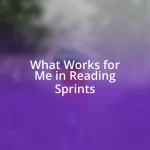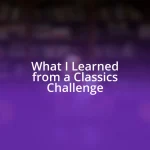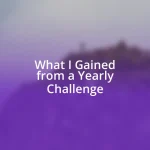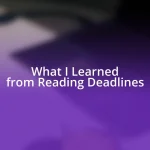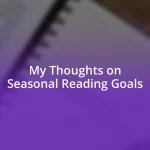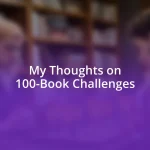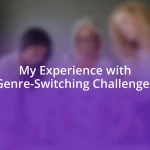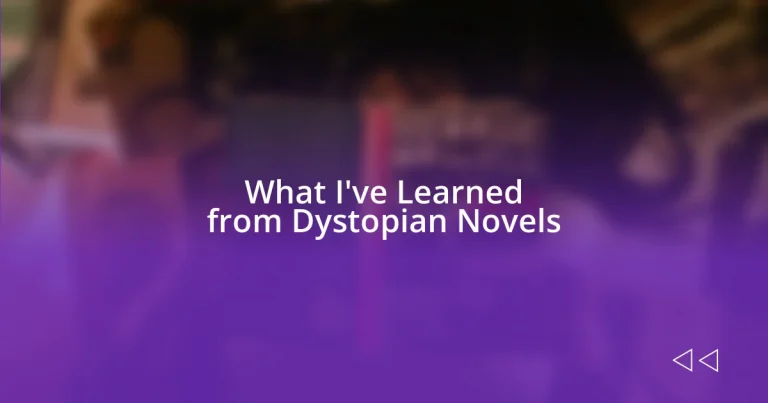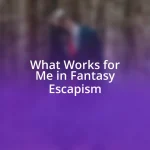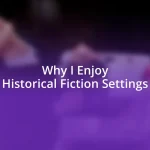Key takeaways:
- Dystopian literature serves as a cautionary reflection on societal issues, highlighting themes of freedom versus oppression, the impact of technology, and environmental degradation.
- Key lessons from these narratives emphasize the importance of civic responsibility, vigilance against complacency, and the need for community and adaptability in times of crisis.
- Engaging with dystopian novels fosters empathy and self-reflection, prompting readers to consider their values, relationships, and responses to societal challenges.

Understanding Dystopian Literature’s Impact
Dystopian literature impacts us by reflecting our deepest fears and anxieties about society. Have you ever closed a book, feeling as if it held a mirror up to the darkest parts of our world? When I read “1984” by George Orwell, I couldn’t shake the haunting sense that the power of surveillance and control was more real than fiction; it left me questioning how much privacy I truly have in today’s technocratic world.
These stories often serve as warnings of what could happen if societal issues remain unaddressed. I remember feeling a chill when I realized the parallels between the world of “The Handmaid’s Tale” and the conversations happening around women’s rights and autonomy today. It struck me that these novels aren’t just escapist tales; they are profound commentaries on our potential futures if complacency sets in.
Moreover, dystopian narratives foster empathy by placing readers in the shoes of the oppressed. I found myself deeply moved by characters like Katniss Everdeen in “The Hunger Games,” who embodies the struggle against injustice. How can we ignore the lessons they offer when they vividly demonstrate the importance of courage and resilience in the face of overwhelming odds?
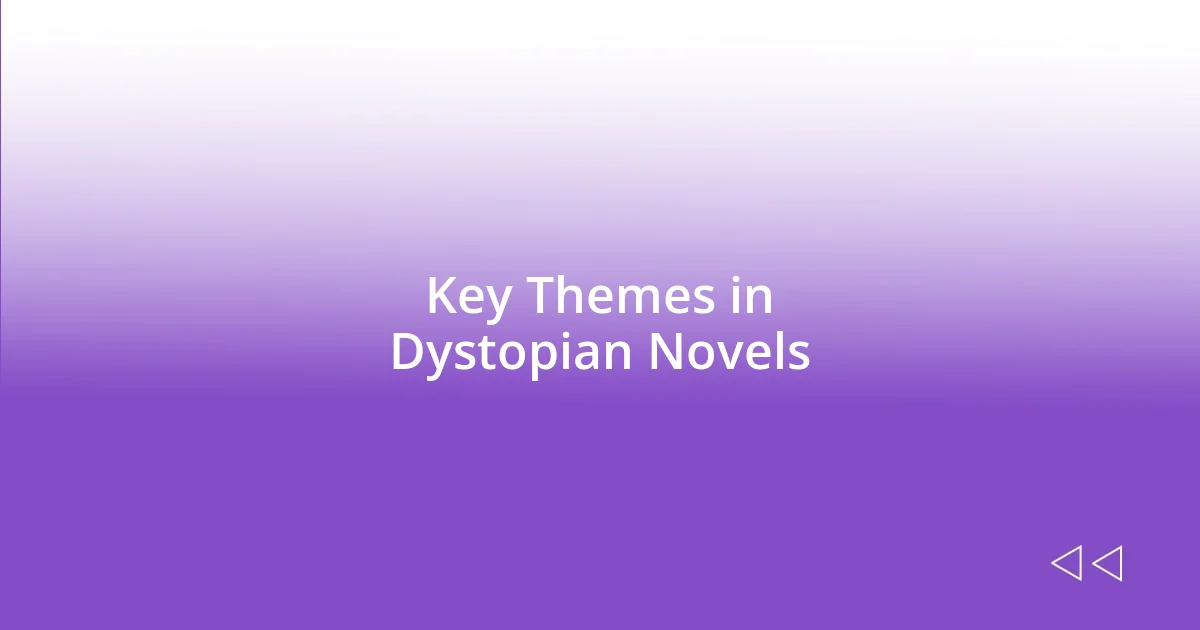
Key Themes in Dystopian Novels
The exploration of freedom versus oppression is a dominant theme in many dystopian novels. When I read “Fahrenheit 451,” I was struck by how the government suppressed knowledge through book burnings, which felt alarmingly relevant. It made me reflect on the value of free thought and expression—how crucial they are to our society. Have you ever considered how easily our current freedoms could be compromised if we don’t stay vigilant?
Another recurring theme is the impact of technology on humanity. In “Brave New World,” Aldous Huxley portrays a society overly reliant on technological advances, prioritizing convenience over genuine human connection. This narrative forced me to think about my own technology use and whether it enhances or detracts from my relationships. When was the last time you put down your device to truly engage with someone?
Environmental degradation also surfaces as a significant theme. I vividly remember the unsettling feeling after reading “The Road” by Cormac McCarthy; it presents a world devastated by ecological collapse. It left me questioning our planet’s future and my role in preserving it. How can we read these cautionary tales and not feel a sense of urgency to act?
| Key Themes | Examples |
|---|---|
| Freedom vs. Oppression | “Fahrenheit 451” |
| Technology’s Impact | “Brave New World” |
| Environmental Degradation | “The Road” |
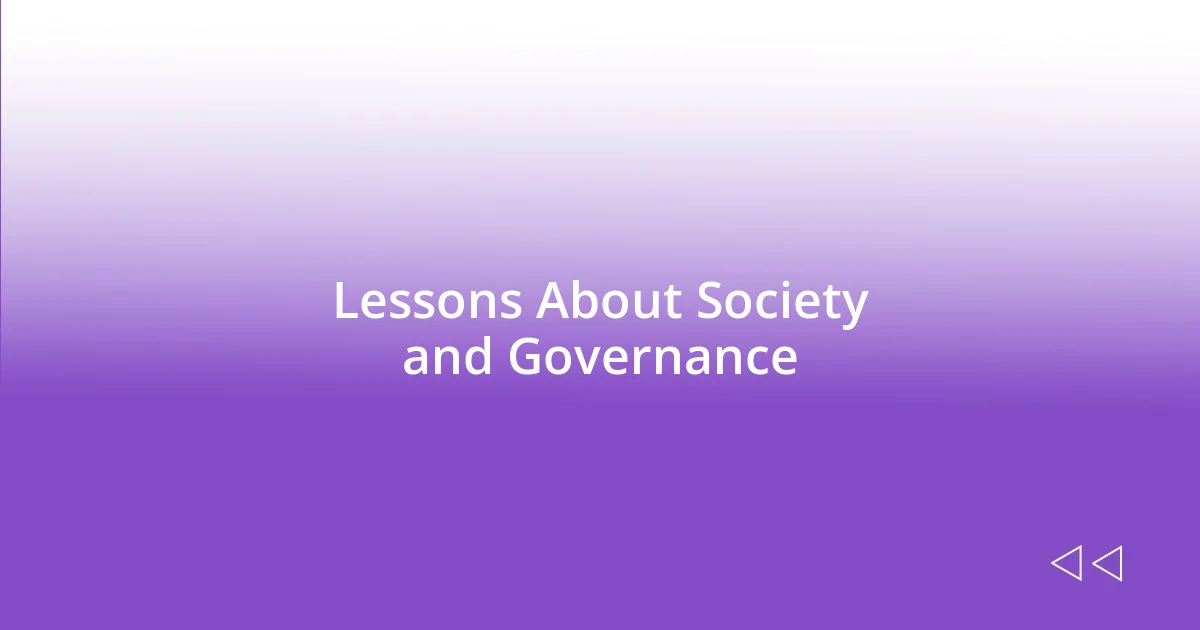
Lessons About Society and Governance
In exploring lessons about society and governance through dystopian novels, I’ve found that these stories often highlight the fragility of our social structures. For instance, after reading “The Handmaid’s Tale,” I felt a profound sense of unease, as it mirrored my concerns about authoritarianism creeping into our daily lives. It reminded me of how swiftly the balance of power can tip if we aren’t vigilant and engaged as citizens.
Dystopian literature also emphasizes the importance of civic responsibility. I often think of “V for Vendetta,” where the protagonist symbolizes the fight against oppression and the need for citizens to stand up for their rights. It teaches us that our voices and actions matter in a democracy. Here are some key takeaways that resonate with my own experiences:
- Vigilance is Crucial: Just as the characters confront complacency, I believe we must remain aware of our rights and freedoms.
- Accountability in Leadership: These tales encourage us to demand transparency and integrity from those in power.
- Participation Matters: Engaging in civic duties isn’t just a privilege but a necessity to prevent societal decline.
Every time I reflect on these novels, I come away with a renewed sense of purpose; they urge us to be proactive in shaping a healthy, just society.
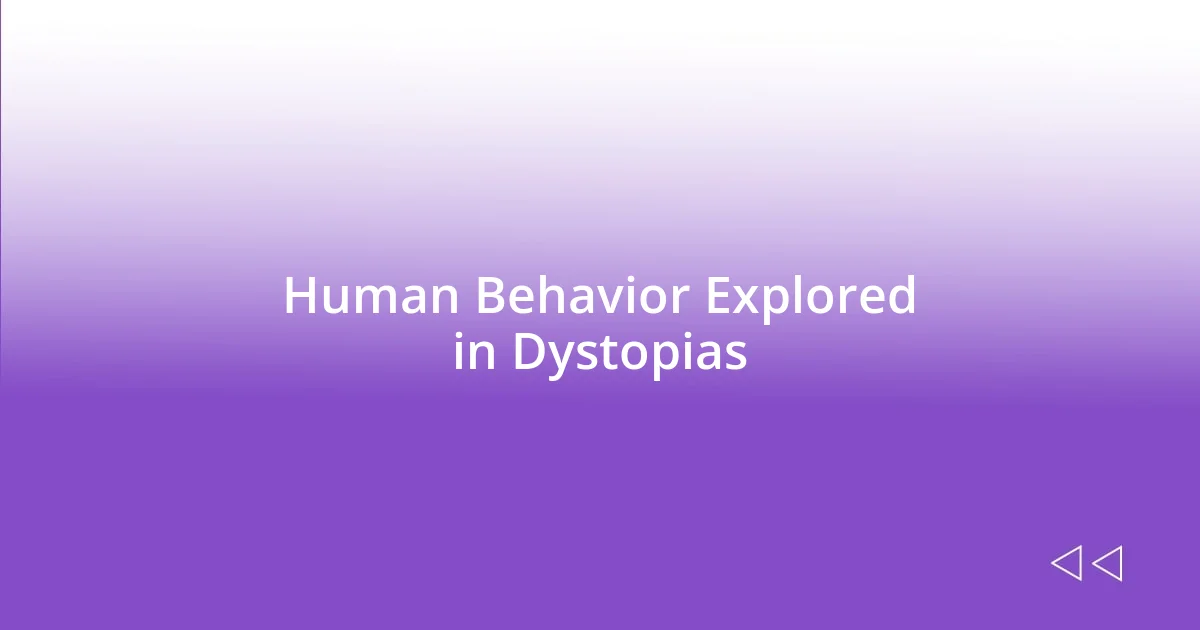
Human Behavior Explored in Dystopias
In dystopian novels, human behavior often reveals our deepest instincts—fear, survival, and resilience. I remember feeling a chill while reading “The Road.” The characters’ relentless struggle for survival, clinging to the last vestiges of hope, made me reflect on how easily we can be pushed to our limits. It’s astonishing to think: What would I do to protect my loved ones in a world like that?
Additionally, the dynamics of power and control in these narratives shed light on how people respond to authoritarianism. “The Handmaid’s Tale” profoundly impacted me; witnessing the characters’ responses to oppression prompted me to consider how I might react in a similar scenario. Would I be compliant, or would I resist? It raises a compelling question about our moral compass—are some willing to sacrifice their values for safety?
Moreover, the exploration of community and connection in dystopias highlights our innate need for belonging. In “Station Eleven,” I was struck by how the survivors formed bonds in the face of disaster, illustrating that even amid chaos, relationships can be a source of strength. Have you ever thought about the people in your life who motivate you to persevere? This narrative prompts a deeper understanding of how we navigate our toughest moments and lean on each other for support.
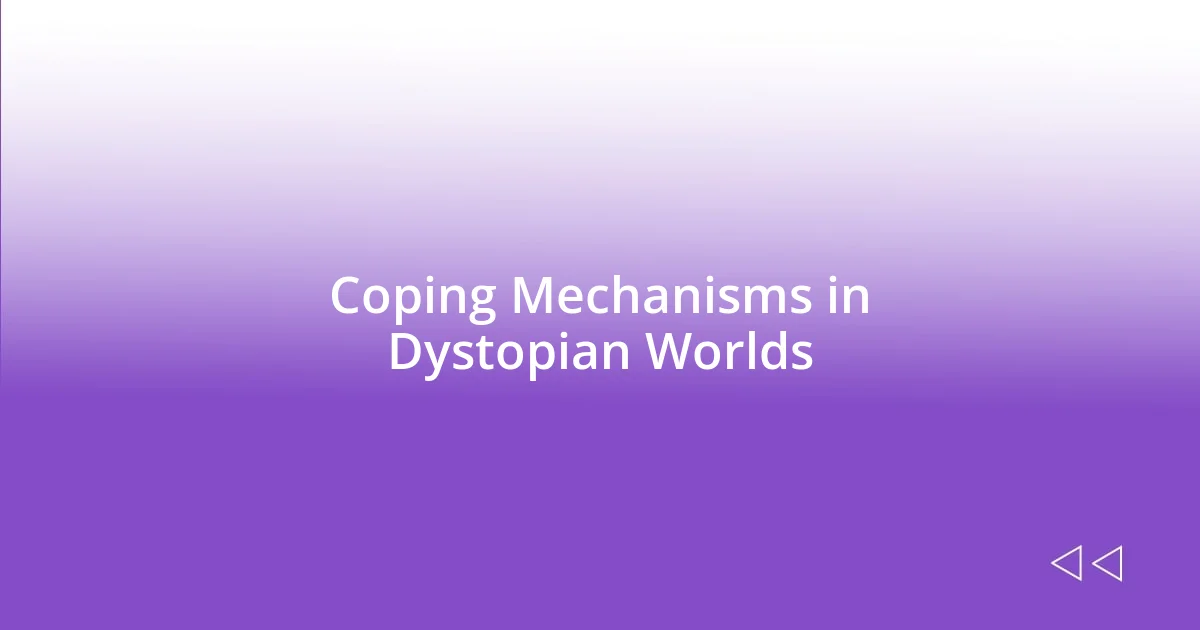
Coping Mechanisms in Dystopian Worlds
In dystopian worlds, characters often rely on unique coping mechanisms to navigate their bleak realities. I recall feeling a sense of camaraderie with the characters in “The Book of the New Sun,” who use storytelling as a way to retain their humanity. It struck me that sharing narratives can be a powerful tool for connection, reminding us all of our shared experiences, even when faced with adversity. How do you find ways to cope in overwhelming situations? I’ve often turned to writing as my escape, channeling my thoughts into words just like those characters do.
Another powerful coping strategy depicted in dystopian literature is rebellion against oppressive systems. Take “1984,” for example; Winston’s small acts of defiance—not just his infamous diary but his love for Julia—show how rebellion can be a means of asserting one’s identity. I was moved by the reminder that even in the darkest times, the spark of resistance can ignite hope. There’s a profound lesson here: by reclaiming our agency, we find strength in our convictions. Have you ever taken a stand for what you believe in, regardless of the consequences? I have, and it always feels both terrifying and exhilarating.
Furthermore, the themes of solitude and introspection in these narratives highlight the importance of self-reflection as a coping mechanism. In “The Handmaid’s Tale,” Offred’s inner monologues resonate with me, as they demonstrate how mental escape can offer solace amidst chaos. After facing personal challenges myself, I’ve learned that reflecting on my thoughts helps me reclaim my sense of self. What does your inner dialogue sound like? I find that embracing solitude often reveals essential truths that might otherwise be overlooked, fostering resilience in difficult times.
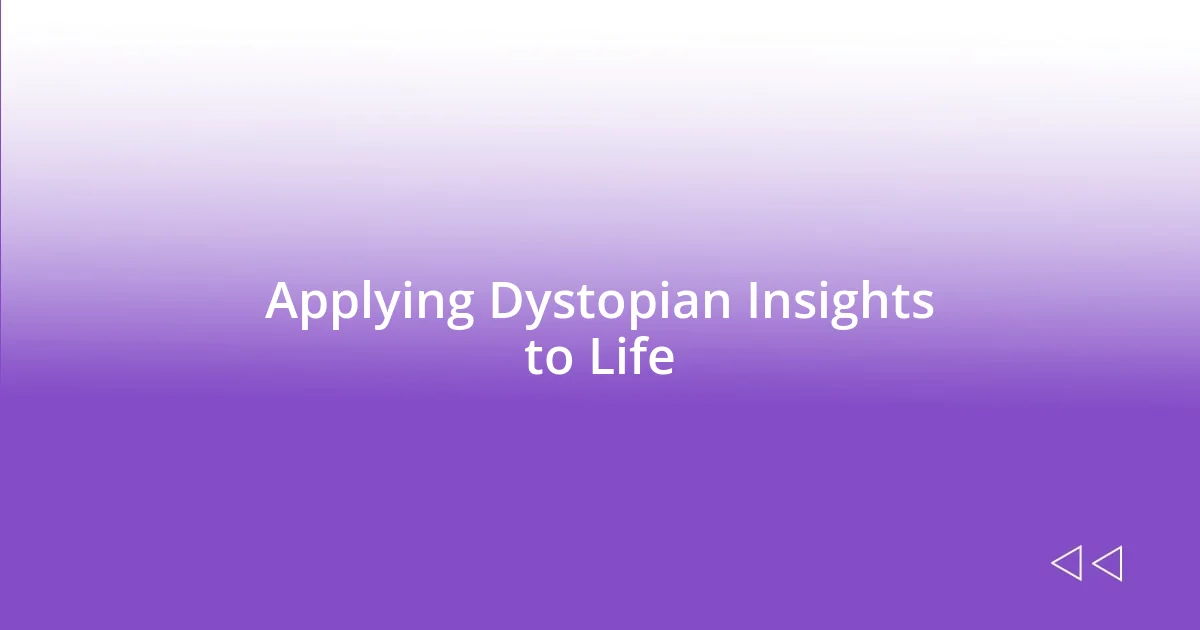
Applying Dystopian Insights to Life
Applying insights from dystopian novels to our everyday lives can be quite enlightening. I’ve realized how important it is to remain vigilant about the political and social systems we’re a part of. After reading “Fahrenheit 451,” I couldn’t help but reflect on how easily we can take knowledge for granted; it motivated me to adopt more critical thinking in my daily decisions. Do you ever stop and consider what you might be missing in the world around you?
Another lesson I’ve cultivated from these narratives is the value of community. In “Parable of the Sower,” Lauren Olamina’s journey shows the power of finding strength in numbers when faced with an unforgiving world. This insight prompted me to reach out more often to my own friends and family during tough times, reminding me that we all share the burden of life’s challenges. Have you leaned on someone lately? It’s amazing how we can uplift one another through connection.
Finally, I’ve come to appreciate the necessity of adaptability. Characters in “The Road” demonstrate that survival hinges not just on physical endurance, but on the ability to pivot and learn from their harsh surroundings. This resonates deeply with me, especially during unpredictable situations in life. I recall a moment when I had to completely rearrange my plans due to unforeseen circumstances, and it taught me that flexibility can transform obstacles into opportunities. How do you adapt to change when it approaches? So often, it’s our mindset that shapes our reality.
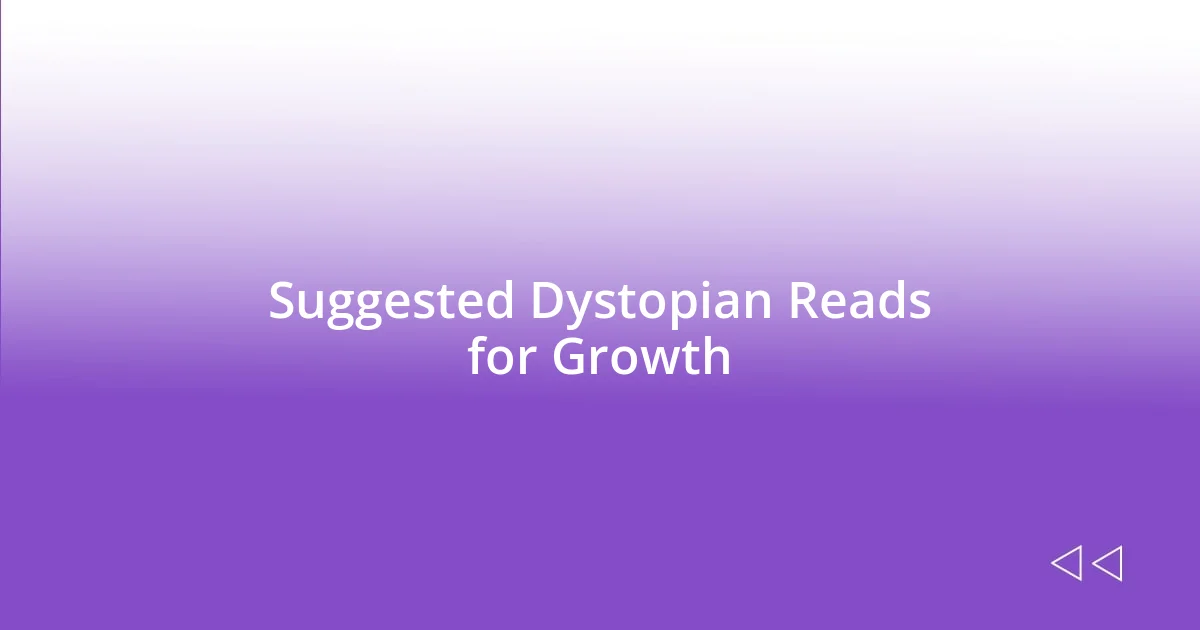
Suggested Dystopian Reads for Growth
I highly recommend diving into “Brave New World,” as it illustrates the perils of a society obsessed with pleasure at the expense of individuality. While reading, I felt this eerie familiarity with our contemporary social dynamics, especially in how technology sometimes distracts us from authentic connections. Do you sometimes wonder if we value superficial comfort over genuine relationships? That reflection made me more mindful of my interactions, prompting me to seek deeper connections.
Another powerful read is “The Power,” which flips the narrative by showcasing women gaining control through an electrifying ability. As I turned each page, I was struck by how empowerment can manifest in various forms. It made me think about my own moments of empowerment—when I challenged societal norms or stood up in a meeting. Have you ever felt that surge of strength? It’s a reminder that growth can stem from courage, and it’s something we should celebrate collectively.
Lastly, consider exploring “The Dispossessed.” It challenges the reader to evaluate the concept of utopia versus dystopia through its dual societies. This book resonated with me as it compelled me to assess my own beliefs about freedom and community. I often reflect on my past choices and how they align—or clash—with my ideals. How do your values shape your decisions? Engaging with these narratives has deepened my self-awareness and helped me embrace complexity, allowing for richer conversations about our shared humanity.
